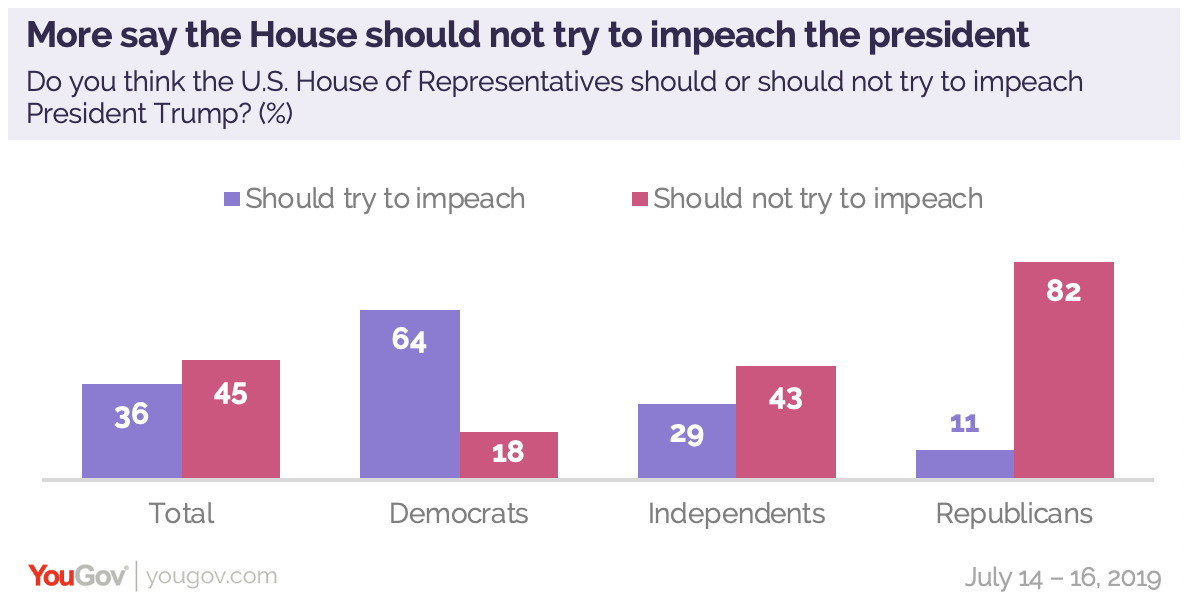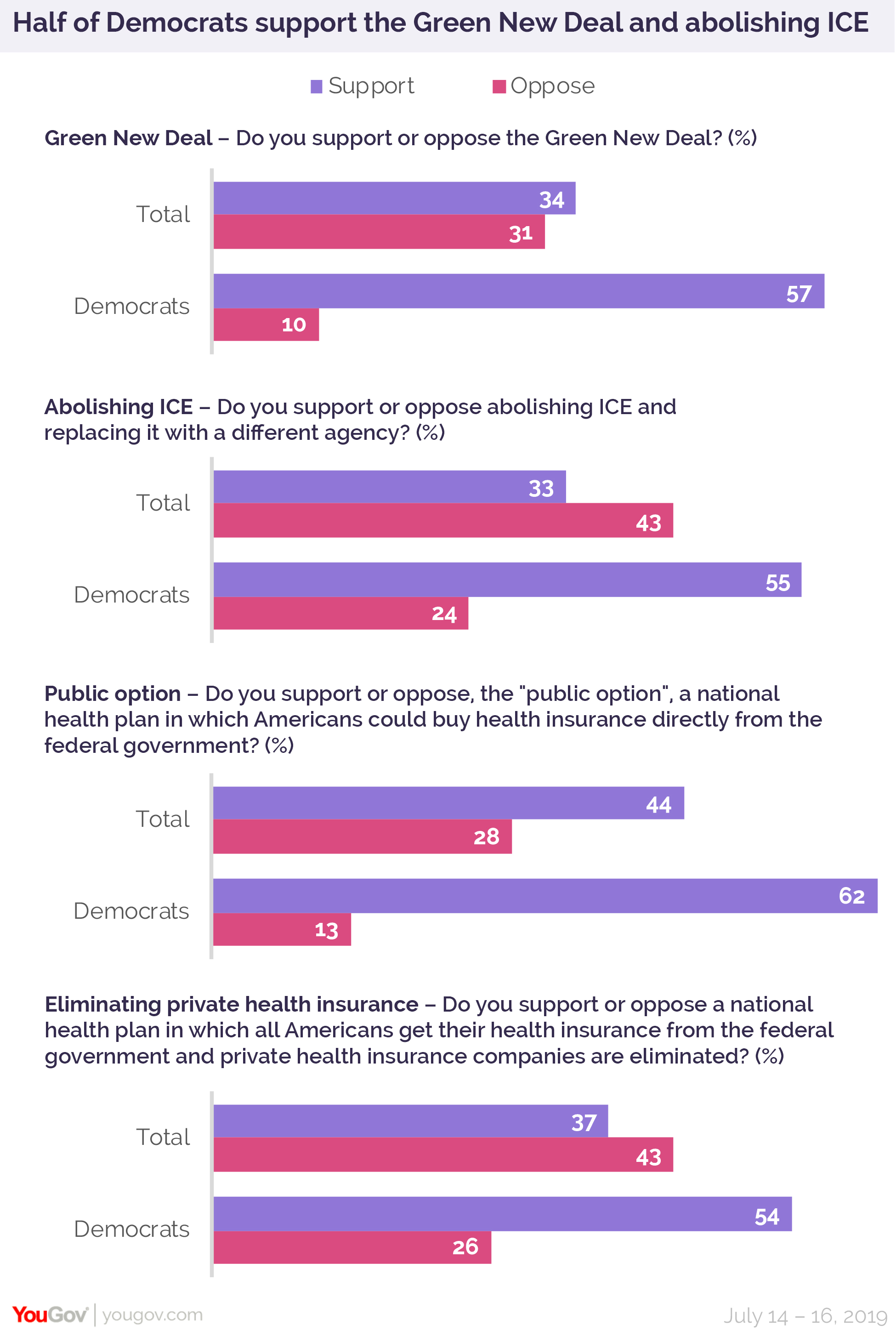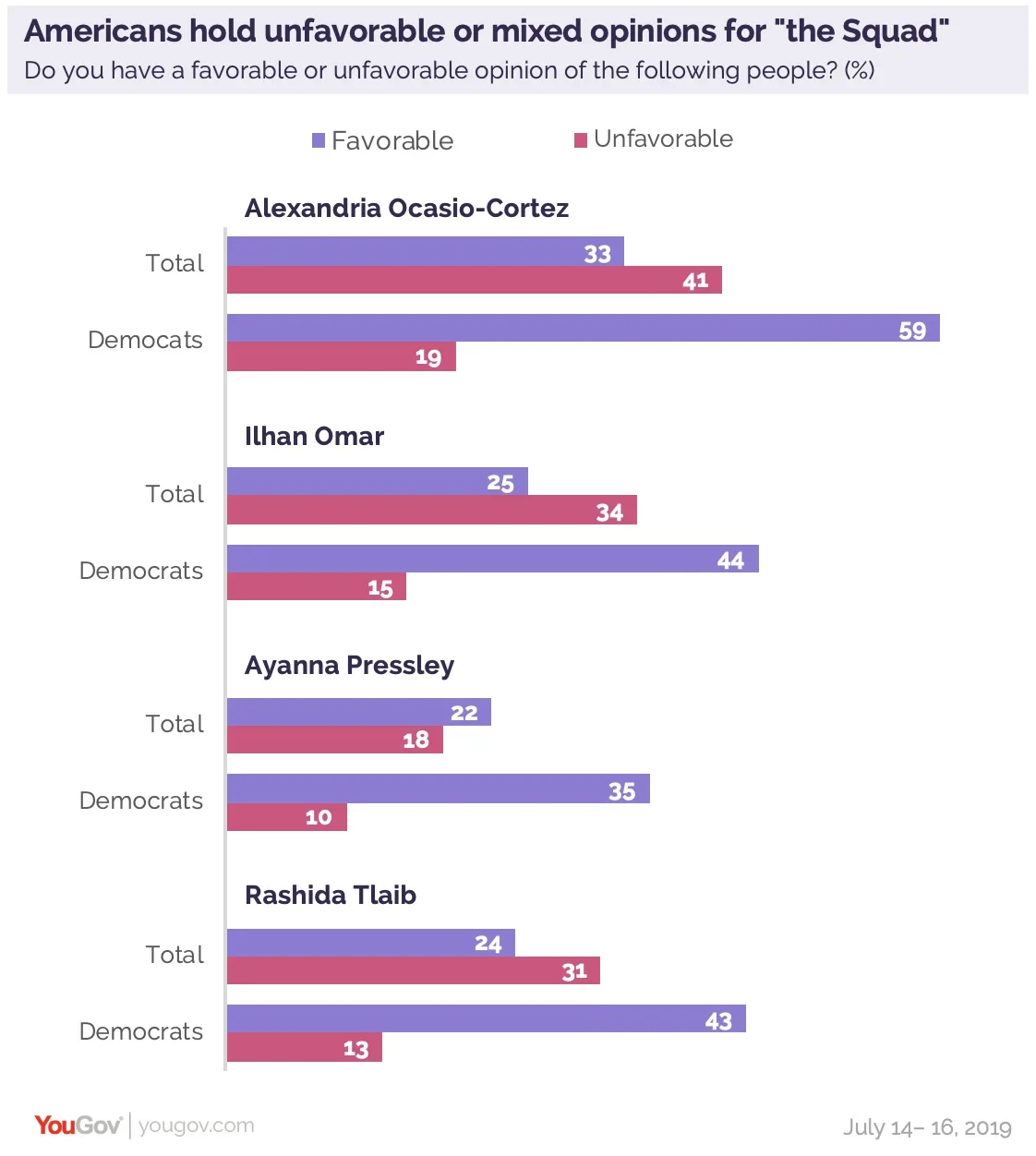President Donald Trump’s tweets attacking “The Squad”—four freshman Democratic Congresswomen who have criticized him – may have made them better known.
The four women of color remain popular with Democrats in the latest Economist/YouGov Poll. Democrats have positive opinions about all of them. In addition, Democrats are on board with many of their policy proposals. But many of those issues, like Tuesday’s House vote condemning the president’s tweet, divide the country on partisan lines.
Democrats have favorable opinions about Representatives Ilhan Omar (Minnesota), Rashida Tlaib (Michigan), Alexandria Ocasio-Cortez (New York), and Ayanna Pressley (Massachusetts). Pressley is the least well-known, and Ocasio-Cortez the best-known (nearly as many Democrats knew who Ocasio-Cortez was when she entered Congress in January as do today). However, the public overall is generally negative or mixed in how they view them, as more than half of Republicans have unfavorable opinions of Omar and Tlaib. 71 percent hold unfavorable views of Ocasio-Cortez.
Opinions among Democrats have changed little on these freshman women while they have been in Congress.
Speaker of the House Nancy Pelosi, who has served in Congress for more than three decades, is much better-known than the four Squad members, and better-liked by Democrats (but like the Squad, she also has a negative rating from the public overall). At the beginning of this term as Speaker, Pelosi fared about as well with Democrats as she does this week. She has slipped a bit with liberal Democrats. Through March, there were weeks when more than 80 percent of liberal Democrats had a favorable opinion of Pelosi. Her rating with this group is still high: 75 percent of liberal Democrats are favorable, but 17 percent are not.
Democrats overwhelmingly approve of how Pelosi is handling her job: 69 percent approve; but 18 percent don’t.
The president accused the four freshman Congresswomen of “loudly and viciously telling the people of the United States … how our government is to be run.” But in an Economist/YouGov Poll conducted just before the Fourth of July, Americans overall – including most Republicans -- agreed that a person can criticize the president and still be patriotic (Republicans agreed, 58 percent to 31 percent, that criticism of President Trump didn’t mean that someone is unpatriotic, though even more Republicans, 74 percent, believed criticism of his Democratic predecessor, Barack Obama, could be patriotic).
The president’s first critical tweets themselves were supported by Republicans, with nearly half in the YouGov Tweetindex categorizing them as “great.” 71 percent of Democrats called them “terrible.” Independents were negative, with more than half saying they were “bad” or “terrible,” and only 30% saying they were “good” or “great.” 57 percent of Republicans find the President’s overall use of Twitter “appropriate.” Just about as many adults overall (56%) say the opposite.
Democrats also want much of what the Squad supports. That is clearest when it comes to the possible impeachment of the President. But impeachment is not something the public overall wants. 
The desire to impeach the President is shared across the Democratic Party, whatever their ideology. Democrats with a favorable opinion of Nancy Pelosi are just as likely to want impeachment to move forward as those who dislike her.
There are other “Squad” priorities. On some, like Medicare for All, and a public option for health insurance, they are in sync with Americans overall, while on others, like eliminating private health care and covering undocumented immigrants, they are supported by Democrats only. 55% of Democrats, but only a third of the public overall, would abolish ICE, the Immigration and Customs Enforcement agency.
It is worth noting two things that suggest that Americans, while they oppose abolishing ICE, aren’t happy with the border policy. As many in this poll have an unfavorable opinion of the agency as a favorable one, and by 55% to 32%, the public disapproves of the policy of family separation. However, Republicans approve, 65% to 26%.
And while the Green New Deal itself gets a mixed evaluation overall (though Democrats support it by more than five to one), concern about the environment is high. In the last month, Americans saw record heat in Europe, record high temperatures in Alaska, the arrival of the first hurricane to make landfall in the U.S. this season, wildfires in Western states, and a rash of tornadoes. Nearly two in three (63%) agree that climate change exists and is caused by human activity.
Those who see climate change as a human responsibility support the Green New Deal five to one.
See the full toplines and tables results from this Economist/YouGov poll.

Image: Getty













